In his History of Philosophy, Hegel delves into the relationship between previous schools of thought and philosophy. Though the formal difference between philosophical theories is continuously stressed, Hegel reveals how seemingly contradictory theories all offer a window onto aspects of the truth. That is, ideas which reflect the way the world in fact is and conform to its laws.
Though it is rather fashionable for philosophy departments to treat philosophers like Spinoza as “dead dogs”, Marx did not share these shrill pretensions. In fact, as Hegel himself pointed out, philosophical theories, and development of thought in general, both negates and preserves the essence of what has come before.
These contending philosophies and philosophers, instead of discarding what came before, complement and complete one another. Marxist philosophy is no deviation to this general process. Dialectical materialism, the philosophy of Marxism, is greatly indebted to the theoretical struggles of the past.
Can we even be certain of anything?
After philosophy set itself free from spiritual domination of religion and theology (with the fall of feudal society and the beginnings of the bourgeois revolution in science), it searched for a firm foundation for knowledge. This epoch ushered sharp twists and turns in the sphere of philosophy.
The bourgeois philosophers all contributed to the way in which we understand the world around us. This bore fruit for science, with Kant’s ‘Copernican revolution’ in cosmology, as well as figures such as Descartes and Liebniz making impressive contributions to mathematics.
Despite this, the relationship between the thinking subject (thought) and the objective world (being) was often extremely obscured. Wholesale scepticism pervaded for a time as everything was thrown into question.
Descartes argued that the only immutable truth we can know is captured by the much celebrated phrase ‘I think, therefore I am’. Essentially, he attempted to sever thought (consciousness/soul) from matter, with matter having spatial extension and the soul having none. This landed him in a deep quagmire.
If thought and matter are completely separate, or even diametrically opposed, then by what means are they united and how do they interact? The fundamental issue is the treating of consciousness as something mysterious and incorporeal, which reflected the limited scope of science at the time.
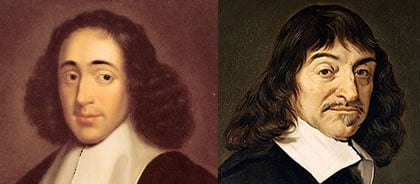
Pictured: Spinoza (left) and Descartes (right)
The unresolved dualism – that mind and body are separate and distinct – is the Achilles heel of Descartes’ theory. It ultimately leads him to invoke divine intervention – it is God that makes the movement of matter and mind coincide. But how does God achieve this? Of this Descartes says nothing. So, his invocation of God explains nothing at all.
Interestingly, it did not take the advances in modern science to point out Descartes’ erroneous ways. Spinoza broke the spell by arguing that there is no such separation between body and soul; these are two attributes of the same thing. Instead of mind and matter artificially divided, Spinoza understood that there was only one single substance that is infinite and eternal.
Though Spinoza identifies Substance with God, if we were to substitute this for ‘matter’ we would be very close to explaining the world in a materialist way: emphasising the primacy of matter, and explaining nature in terms of nature itself. It is not for nothing that he was accused of being an atheist by his contemporaries. Both Marx and Hegel were greatly indebted to the insights of Spinoza, who was a giant of his time.
The problem of knowledge
The problem still remained as to how we know the world around us. All the bourgeois philosophers that tried to solve this problem fell at the first hurdle. The issue was that they approached the question using formal logic as their basis, which was the mode of reasoning of the bourgeois scientific revolutions.
Formal logic is a set of rules that validate and invalidate certain propositions. The most basic rule is the law of identity: ‘A’ is ‘A’. It is from this rule that the laws of non-contradiction (contradictory propositions cannot both be true at the same time) and the law of the excluded middle (either a proposition is true or its negation is true) are derived. But this produces two problems.
Firstly, how can the thinking subject know a thing when it is formally different from it? Secondly, how can science operate – making predictions on the basis of cause and effect – when it talks of phenomena seamlessly transitioning from one state to another, violating the basic law of identity?
The straightjacket that this logic landed philosophy in is best expressed through Hume and Kant. The cornerstone of Hume’s philosophy is that causation is simply a ‘habit of the mind’, since we cannot experience cause as such, only a string of separate events. Hume would have us believe that regularity is a prejudice; we cannot ‘prove’ that it exists in the real world.
Kant, on the other hand, accepted that contradiction exists within thought. He showed that formal logic falls into ‘antinomies’; that is to say, it is possible to derive diametrically opposed conclusions from the same propositions. He agreed with the empiricists that all we can know is what is given to us in sense experience (rather than inborn knowledge from the soul), but the objects-in-themselves, which cause these sensations, cannot be known. This led to a whole host of blunders.
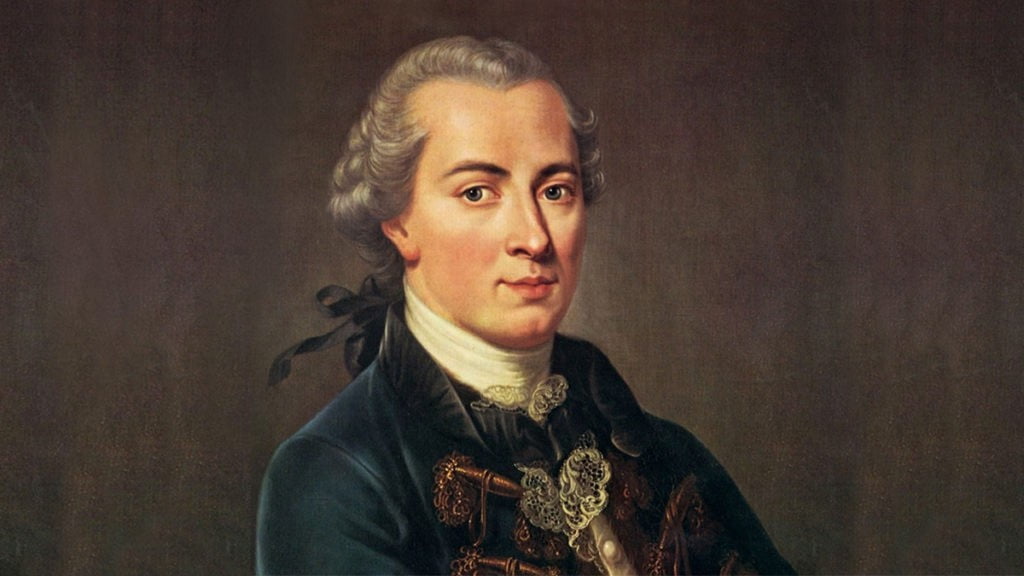
Pictured: Immanuel Kant (1724-1804)
Since we can never know ‘things-in-themselves’, Kant is forced to rely on internal, abstract categories of thought. Human thinking faces a contradiction between the universal and particular – how can we know general concepts like ‘man’ without referring to how men actually are in the real world that we experience through our senses? This is something that he passes over in silence.
A central issue with Kant is that he places a limit on human knowledge. As Hegel would later argue, he did not see the relation between appearance and essence. When we know the sum total properties of a particular thing, then we can say that we know the thing itself. There is no phantom metaphysical ‘thing-in-itself’ that lurks behind.
The genius of Hegel
Hegel – in contrast to the static ‘formal logic’, which underpinned most philosophy at the time – based himself instead on dialectical logic, a system of thought based on movement, change, contradiction and fluidity. The essence is captured most simply by the aphorism of Heraclitus: “everything both is and is not, for everything is in flux.”
Hegel took up this dialectical conception of the ancient Greeks, and greatly enriched its content. For the first time, the whole universe – including nature, human history and thought – was viewed as one interconnected whole in a ceaseless process of development, with change proceeding generally from lower to higher forms.
The mould of the old metaphysicians which relied on motionless imprints of reality – forcing messy reality into rigid and static categories – had been demolished. This was nothing short of a revolution in philosophy. As Hegel wrote in his Logic: “Dialectics is in general the principle of all motion, all life in the actual world.”
Hegel argued that the process of thinking is the unity of subject and object. Consciousness, far from being a barrier that separates us from the world, connects us to it. Unlike the empiricists such as Locke, for Hegel thinking is not merely contemplative; it is necessary for the subject to be active and immerse themselves in the study of the object.

Pictured: G.W.F. Hegel (1770-1831)
We must break down the immediate facts and penetrate deeper than the surface level to understand the necessary laws of motion. Formal logic does not deal with the world in its motion, nor how things evolve through their own contradictory nature. The law of identity is an abstract form with no real content. All attempts to fix the truth as one-sided and static are doomed to fail.
Despite this breakthrough, Hegel was an idealist. He could not conceive of being without thought, and in this sense placed the cart before the horse – failing to properly address the problem of knowledge.
As a man of his time, he attempted to develop an all-encompassing system of philosophy that pertained to some absolute truth. Engels’ wryly remarked that the only thing ‘absolute’ about Hegel’s absolute truth was that he had “absolutely nothing to say about it”.
Rather than concepts being the reflection of the self-development of nature and society, he saw the movement of nature and society as reflections of the development of ideal concepts (such as “being” and “essence”) into the ‘Absolute Idea’.
Whilst explaining the infinite process of the development of the universe, and with it, human thought, Hegel demolished the idea that humans could arrive at an all-encompassing absolute truth. But at the same time, Hegel claimed to have discovered this very absolute truth in the form of his philosophical system, which posited the Absolute Idea as the end point to all development.
Hegel believed that not only had philosophy reached its ultimate end point of development, but so too had political development. His philosophy led him to the conservative conclusion of supporting the Prussian monarchy.
From Feuerbach to Marx
Between Hegel and the philosophy of Marx stood Ludwig Feuerbach. Dissatisfied with the idealism of Hegel’s system, Feuerbach set about ruthless criticism of it from the standpoint of materialism. This had a profound effect on both Marx and Engels.
Feuerbach’s commitment to materialism can be seen in the way that he explains nature existing independently of man, and that we are part of nature ourselves. It is not matter that is a product of the mind, but mind that is the highest product of matter. But despite this advance, Feuerbach stopped short.
Feuerbach rejected what was rational in the Hegelian system: his dialectical method. He threw the baby out with the bathwater, resulting in a one-sided philosophical theory. Feuerbach explained all thought, and religious thinking in particular, as a product of the mind of man – but it was ‘man’ in the abstract rather than men and women living in concrete historical periods.
Feuerbach takes man not as a social being, but as an abstract individual. As Marx would later explain, the nature of human beings can only be understood in their social context: and as material conditions change, we see human nature transformed and re-transformed on the basis of events.
Treating men and women abstractly divorces our existence from society, and serves to mystify rather than clarify the real ways we relate to one another, including the class relations and dynamics of society. This opened the backdoor to idealism and mysticism.
The “cult of abstract man”, Engels wrote, “had to be replaced by the science of real men and of their historical development”. This was the next step taken by Marx and Engels.
Marx cuts the Gordian knot
Engels explains that materialism is nothing more than comprehending the world around us “free from preconceived idealist crotchets”. Marx did not see thought or sensations as distinct from the rest of the material world; the mind itself is the highest expression of matter. In principle, there is nothing beyond what we can register, break down, measure and discover. These are the real relations between these things.
The conservatism of Hegel’s system that posited an “Absolute Idea” needed to be done away with to salvage the real, revolutionary side: the dialectical method.
Hegel made a breakthrough by explaining that consciousness is not a finished, self-contained entity, but is contradictory and transformed on the basis of such contradictions. Marx finished this by explaining it in more concrete, historical and scientific terms. As he explained, social being determines consciousness.
The problem of the interaction between subject and object had to be resolved in practice. The Cartesian scepticism, as well as Hume’s agnosticism, is a purely scholastic matter. As Marx wrote:
“Social life is essentially practical. All mysteries which mislead theory to mysticism find their rational solution in human practice and in the comprehension of this practice.”
The task is not to resolve whether we can know the world around us by entertaining sceptical hypotheses in seminar rooms or fireside navel-gazing, but through practice and history. It was Marx’s scientific approach to history that conclusively proved that we are not merely passive agents. Though we do not choose the material conditions we are born into, we are capable of transforming them and thereby making our own history.
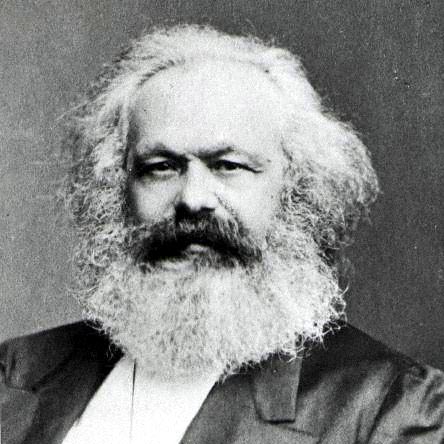
Pictured: Karl Marx (1818-1883)
It is the practical relations that we enter into which result in class struggle. Man exploiting man is not ‘natural’, not some immutable feature of our nature that we are hopeless to change. We are not innately greedy, but rather greed is produced by certain historically evolved social relations, that will in turn cease to be. As Marx would later explain, revolutionary struggle is the midwife of history.
Hegel asserted that real freedom is an appreciation of necessity. Marx did not discard this idea, but built upon the essence of it. Real, conscious freedom is not merely an understanding, but acting on this basis: a dialectical unity of appreciation and action. As Lenin concisely explains in Materialism and Empirio-Criticism:
“Freedom does not consist in the dream of independence from natural laws, but in the knowledge of these laws, and in the possibility this gives of systematically making them work towards definite ends.”
This is a far richer notion of freedom than the famous liberal one, limited to the bourgeois, formal freedom from external interference: the freedom to speak, and to exploit others. For Marx, real freedom means the material ability to change the world based on a full understanding of it. We will be free when human thought and action is no longer hemmed in by capitalism, when instead of blindly chasing individual gain we consciously produce to meet the real needs of humanity.
Understanding that capitalism has reached a dead end, and has nothing more to offer the youth, workers, the unemployed, is only one element in the equation. It is through the struggle for the transformation of society along socialist lines that we can obtain real, conscious freedom.
Philosophy today
With customary arrogance, the jaded academics of today hollow out Marx’s philosophy, if they bother to teach it at all. They smugly find it incompatible with their formalistic logic. The ideas of these professors – which are no means ‘new’ as they proclaim – do not advance human knowledge one iota.
Instead, they shut philosophy off from having any practical application, as an exclusive jaunt for a tiny portion of the population. These ideas clarify nothing, and explain to a large extent the contempt found towards philosophy. The chasm between their esoteric philosophies and practice is as purposeful as it is unbridgeable.
This is why we need a scientific understanding of the world around us. If we are to be serious about overthrowing capitalism, we must also be serious about arming ourselves with a revolutionary philosophy as our guide to action.
Marxism is a philosophy that strives to grasp the world as it is so that we can collectively change it and increase our power over nature, including that of society.
Dialectics reveals the transitory character of everything, including the present social system. Materialism meanwhile explains that it is by changing the social conditions of men and women that you transform their consciousness, not vice versa.
We do not concern ourselves with theory out of mere academic intrigue or reverie, but in order to fight against capitalism and in its place build a better world. Dialectical materialism is our “sharpest weapon”, as Engels explained, against the misery of class society.
Khaled Malachi
Cambridge Marxists
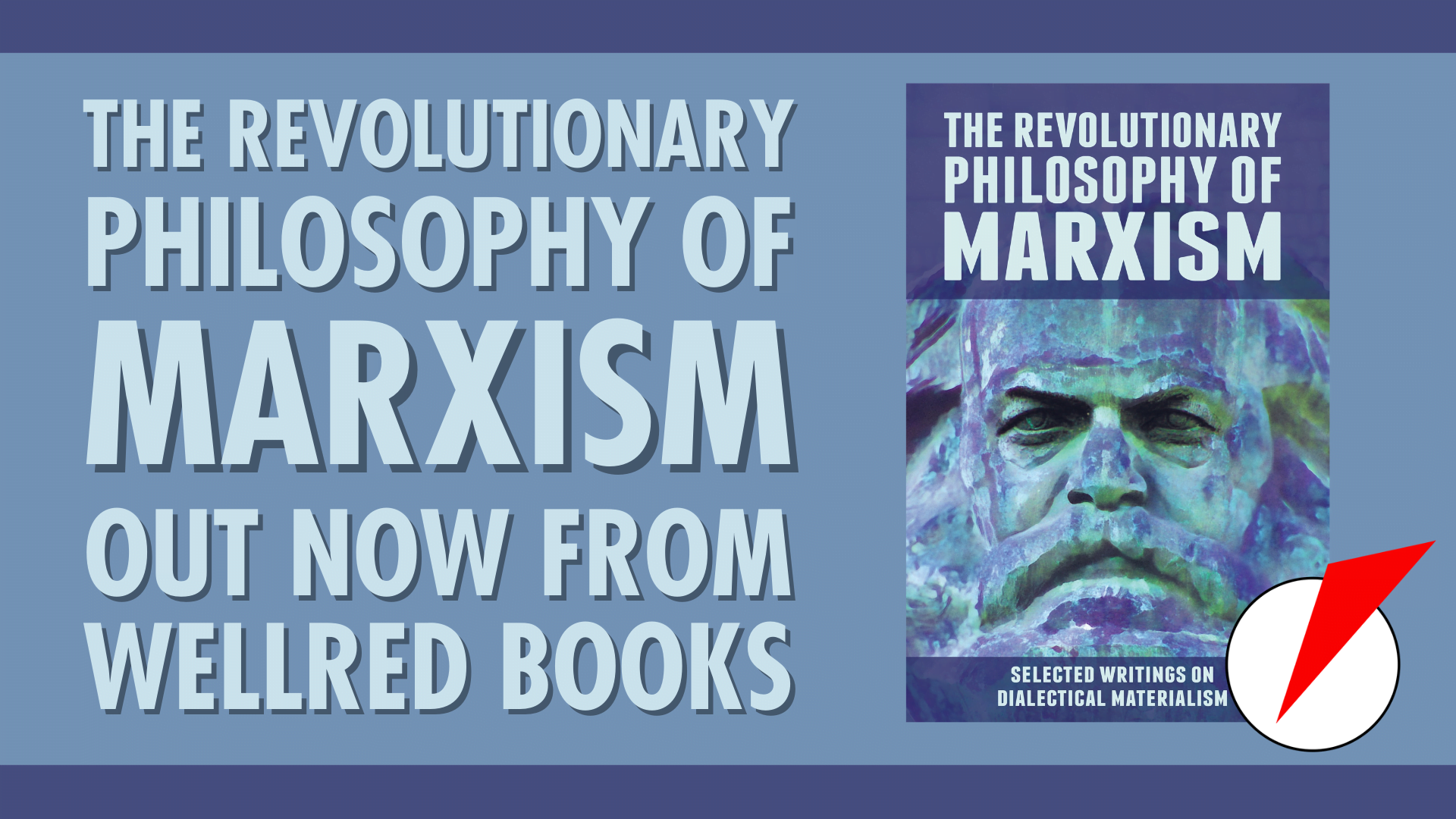

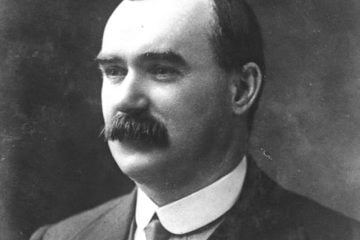
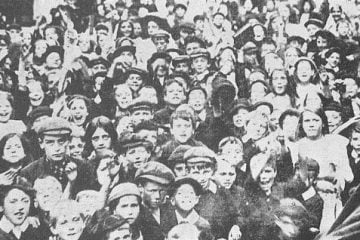

0 Comments